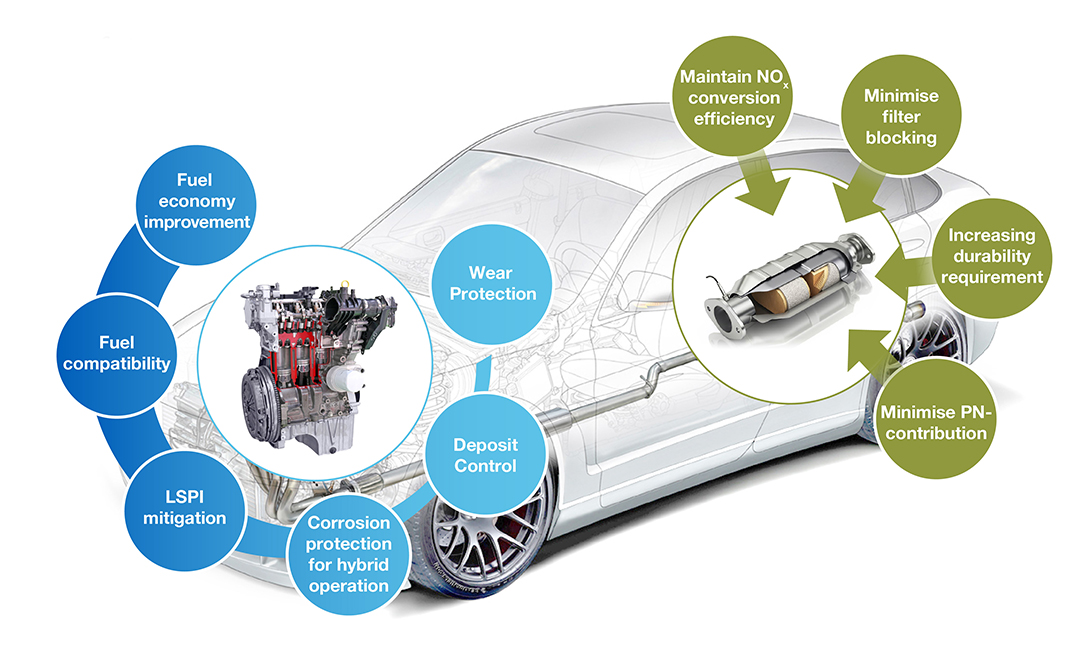Euro 7 Impact on Lubricant Technology
The impact of Euro 7 on engines and aftertreatment will be very significant. For vehicles to operate efficiently with ultra-low emissions levels for their full useful lives, the latest technology will be required. In turn this creates a huge challenge for the fuels and lubricants used. Enhanced fuel economy will be required without any compromise of the protection of complex engines and aftertreatment, and this will require higher performance fuel and lubricant technology than ever before.
Protecting the Engine
The starting point for long-term low emissions is a clean and relatively unworn engine. Both fuels and lubricants play important roles in achieving this goal. Euro 7 fuel injection systems will perform multiple injections of very high-pressure fuel through very fine nozzles every firing stroke in order to provide efficient and thorough fuel/air mixing. The smallest amounts of deposits blocking injector nozzles will cause a large increase in emissions, especially fine particulate emissions. Injector needles need to react extremely quickly to enable multiple injections and any internal deposits will impact their ability to do this. Inlet valve deposits impair the smooth flow of air into the cylinders, affecting the tumble and swirl of the air and reducing mixing efficiency. High performance fuel additives will ensure injectors are kept clean both inside and out and will keep inlet valves clean to allow smooth air flow. They will be a key enabler of Euro 7 compliance.
There are several options to deliver the fuel additive. The first is to dose it into the bulk fuel for sale at the forecourt. However, fuel sales are extremely price sensitive and original equipment manufacturers (OEMs) may not be confident that the appropriate amount and quality of additive is being provided. The second method is to carry the additive onboard and dose into the tank at each fill. This increases the confidence in the delivery of additives, but obviously adds cost and complexity to the vehicle. The third way is to deliver a concentrated dose of additive to act as a “clean up” when the vehicle is serviced. This is a convenient and effective alternative to mechanical cleaning of the injectors and valves and could be an integral part of the service schedule. Similar clean up additives can be bought off the shelf, enabling owners to provide a cleanliness boost between servicing.
Engine oils have always played a key role in enabling clean, efficient engine operation and this role will increase in importance with the arrival of Euro 7. Some of the key functions for reducing emissions will be:
- Keeping piston rings and grooves clean to enable free movement of the rings. This will improve the sealing of the combustion chamber, improving both efficiency and emissions.
- Reducing cylinder and ring wear. This will also improve combustion chamber sealing and will minimize oil consumption.
- Preventing valve train wear. Air flow into the engine relies on precise operation of the valves, which in turn relies on minimal wear of camshafts, chains and other parts of the valvetrain. The best anti-wear technology will be needed in Euro 7 engine oils.
- Emissions from the combustion of the oil itself can be significant, especially in terms the nanoparticles which will be more tightly controlled under Euro 7. Research is currently being undertaken in this relatively new area to ensure the nanoparticle emissions from engine oils are minimized.
- Other important durability functions include prevention of low-speed pre ignition (LSPI), corrosion protection (important for hybrid engines with frequent on/off operation) and compatibility with alternative fuels.
Engine Oil Compatibility with Euro 7 Aftertreatment
Universal adoption of gasoline particulate filters (GPFs) for Euro 7 passenger car engines will be a key driver for light-duty engine oil technologies. GPFs will need to filter particles right down to the new Euro 7 minimum size limit of 10 nanometers and will also need to filter our more particles due to the widening test conditions and the dropping of conformity factors. This finer filtration will increase sensitivity to ash deposits and could lead to rapid GPF blockage. The impact on the engine oil will be primarily on the detergent (the main source of ash). Lower ash limits or alternative detergent chemistry may be needed.
For heavy-duty diesel vehicles, the extremely strict limits on oxides of nitrogen (NOX) in Euro 7 will drive the use of complex aftertreatment located close to the engine to increase catalyst temperatures. This will increase their susceptibility to contamination. Euro 7 heavy-duty aftertreatment systems will incorporate numerous sensors to control their operation and to monitor pollutants in the exhaust stream. Such aftertreatment is still at the prototype stage and more work is needed to understand the engine oil compatibility issues. Current lubricant specification limits on sulphur and phosphorous may need to be tightened, and other elements may need to be restricted. In any case, it is clear that high performance, aftertreatment compatible engine oils will be needed throughout the life of the vehicle for long-term emissions compliance.

Summary
Euro 7 imposes a chain of challenges. Key pollutants will have tighter limits across a wider range of test conditions. In turn new, complex hardware solutions are needed to comply with the regulations and this impacts both fuel and lubricant technologies in order for compliance to be maintained through the life of the vehicle.
At the same time, engine efficiencies must be improved to meet the CO2 challenge. Fuel and lubricant technologies will be key to achieving this. The latest additives will enable engines to provide years of reliable power cleanly and efficiently, with lower emissions. They will play an essential role in improving European air quality and improving the lives of European citizens.
.jpg?h=658&w=1170&la=en&hash=2ABC1BD34C86459161E1A5564A6B790A)
Controlling Nanoparticle Emissions
May 16, 2023
For many years, the health impacts of particulate matter have been known. Tighter particulate number limits included in Euro 7 will be one of the most significant changes in terms of the impact on hardware, fuels and lubricants.

The Importance of Controlling Low-Temperature NOx
April 10, 2023
Significant reductions in the levels of nitrogen oxides (NOx) are a key part of the upcoming Euro 7 vehicle emissions regulations.

How Euro 7 Will Impact Fuels and Lubricants
March 24, 2023
The Euro 7 vehicle emissions regulations will impact several areas of new vehicle design. The initiative will enact stricter standards for all gasoline and diesel vehicles across the light- and heavy-duty spectrum.